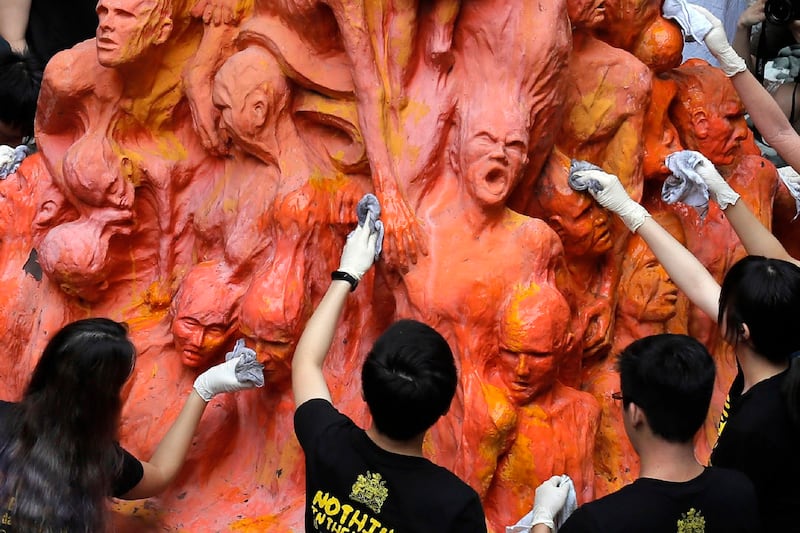The Danish sculptor whose "Pillar of Shame" statue commemorating the 1989 Tiananmen massacre was seized by Hong Kong authorities said he is saddened by a report that he faces arrest if he tries to return to the city to retrieve his work.
Hong Kong police have declined to comment on a report in a pro-China newspaper Wednesday that they are taking steps to arrest sculptor Jens Galschiøt under a national security law forbidding criticism of the authorities.
Asked about the report in the Sing Tao Daily, Galschiøt told Radio Free Asia on Thursday that he hadn't heard of any arrest warrant, but didn't believe such a warrant would be enforceable.

He said he was "sad" that he wouldn't be able to return to the city he loves, despite wanting to collect his original artwork and bring it back to Europe.
“I know Hong Kong has really changed a lot,” he said, adding that almost all of his Hong Kong friends are now in prison amid an ongoing crackdown on dissent.
He said of the “Pillar of Shame”: “I want it back … it’s my private property.”
The Sing Tao Daily quoted a source as saying that "the national security department has formulated plans to arrest Jens Galschiøt for intending to use the 'Pillar of Remembrance" to come to Hong Kong to cause a political disturbance."
Asked to confirm the report, a police spokesperson replied: "We will act based on the situation, and take action according to law."
'Color revolution'
The Sing Tao Daily report also said that if Galschiøt did come to Hong Kong to retrieve his artwork, he could be sent to face trial in mainland China under Article 55 of the law.
"They have decided to activate Article 55 of the Hong Kong National Security Law, meaning that the case will be handed over to [Beijing's] National Security Office in Hong Kong, which can exercise jurisdiction to transfer it to the mainland for trial."
Article 55 of the law, which was imposed on Hong Kong from July 1, 2020 in a bid to crack down on the 2019 pro-democracy movement, allows for national security cases deemed to be of a "serious" nature to be transferred to mainland China for trial.
Hong Kong security chief Chris Tang claimed in a video uploaded to Facebook on Thursday that waves of mass protests against the erosion of the city's freedoms dating back to 2003 were the result of "foreign forces" trying to foment a "color revolution" in Hong Kong.
"The intention of foreign forces to make use of Hong Kong to endanger our national security didn't happen overnight," Tang said in the video. "National security incidents have occurred repeatedly in Hong Kong over the past two decades."
"External forces were already cultivating certain local opposition groups in Hong Kong as early as 2003, organizing large-scale anti-government demonstrations," he said, over footage of a protest by half a million people against national security legislation, known as Article 23. "The anti-Article 23 protests were a trial run for them."

Tang went on to blame the mass protest campaign in 2012 by students -- some of them still in secondary school -- against patriotic education in Hong Kong's schools, the 2014 Occupy Central movement for fully democratic elections, the 2016 " fishball revolution" in Mong Kok and the 2019 movement against extradition to mainland China on the actions of "foreign forces."
"Many young people had been radicalized," said Tang, who was chief of police during the 2019 protests. "External forces were up to the same old tricks again."
His comments were in stark contrast to the reaction of then chief executive Tung Chee-hwa at the time, who said in a statement: "The ... government fully understands that citizens value human rights and freedoms. The government's position is consistent with that of the citizens."
Massive, ongoing crackdown
The first public reference to "foreign forces" came from former chief executive Leung Chun-ying in 2014, when he claimed that "foreign forces have always been involved in Hong Kong politics," without giving specific details.
But the rhetoric around foreign forces and alleged foreign funding didn't become baked into official statements until after the 2019 protest movement. Even during those protests, police made no claims of foreign involvement or funding during their attempts to quell the mass movement, despite such claims being prominent in the political crackdown that followed.
The crackdown has seen senior journalists, pro-democracy media magnate Jimmy Lai and 47 former lawmakers and democracy activists charged with offenses from "collusion with a foreign power" to "subversion."
The national security law applies to speech and acts committed anywhere in the world, and has been used to issue the leaders of the London-based rights group Hong Kong Watch with a takedown order for its website.
Copenhagen-based regional council member Thomas Rohden said via his X account: "So China has found yet another Danish citizen whom they want imprisoned."
"This time it is about the artist Jens Galschiøt. His crime is to draw attention to the Tiananmen Square massacre, through his artistic sculptures. #dkpol," Rohden wrote.
According to Sing Tao, the arrest warrant for Galschiøt is linked to the prosecution of Zeng Yuxuan, a doctoral student from mainland China found in possession of posters depicting the "Pillar of Shame," under colonial-era sedition laws.
Zeng stands accused of conspiring with U.S.-based democracy activist Zhou Fengsuo to "commit acts with seditious intent" ahead of the June 4 massacre anniversary.
Zhou has said he bears full responsibility for creating the materials found in Zeng's possession.
Translated with additional reporting by Luisetta Mudie .
